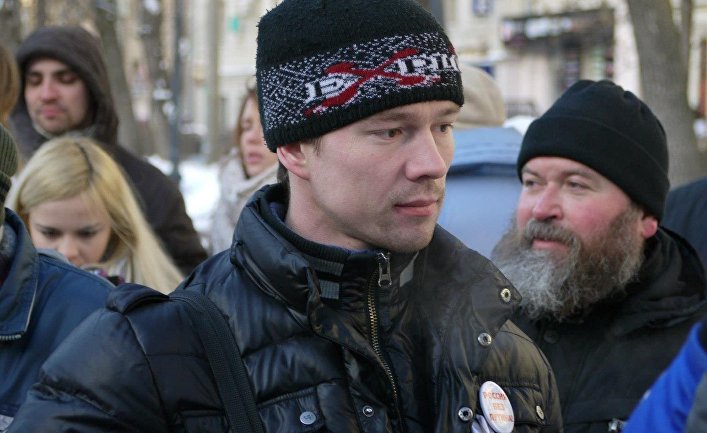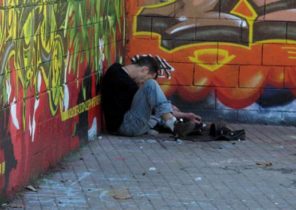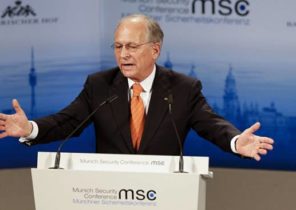
Over the past two years the number of people convicted of extremist crimes in Russia has grown twice, — these are the findings of the Supreme court of Russia. According to the judicial Department of the Supreme court, in the first half of 2016 were issued 227 sentences for “extremist” articles of the Criminal code — article 280 “Public calls for extremist activities” and article 282 “inciting hatred or hostility, and humiliation of human dignity”. In early November 2016 at the Plenum of the Supreme court was called numbers for 2015 — 588 convicted of extremist crimes.
In December 2016 meeting of the Council for human rights, President Vladimir Putin urged to refrain from excesses in initiating criminal cases under article on extremism. “Social networking is increasingly being used for extremist activity, and the state has a natural right to resist”, — quotes the President “Interfax”. “But, of course, under the sly, it is impossible to sum up everything that is handy,” — said Putin, adding that this issue “should carefully deal with it.”
In November 2016, the Supreme court urged courts to carefully analyze the cases connected with the so-called “extremist” repost in social networks. In particular, judges when deciding whether the information is extremist, exciting hatred or enmity, it is recommended to consider the context and form of this information, as well as the presence or absence of any comments to her.
The report of the information analytical center SOVA, dedicated to the practice for improper antiextremism for the period from January to August 2016, it is noted in particular that anti-extremist legislation “was actively used not only against radical opponents of the political regime, but also against the citizens, far from radicalism.” For example, among the cases of misuse of anti-extremist legislation the report’s authors cite the case of the housewife Catherine Volozaninova that a few reposts in social networks “Vkontakte” accused of inciting hatred and hostility to the authorities and “volunteers from Russia fighting on the side of the militia in the East of Ukraine.” She was sentenced to 320 hours of compulsory labor confiscation of the laptop.
Another case, which is described by the OWL — business in Tyumen blogger Alexey kungurova, which is a post in LJ with criticism of the Russian military operation in Syria was accused of “justifying terrorism”. 20 Dec 2016 kungurova was sentenced to 2 years in prison.
Human rights activists and lawyers note that initially the anti-extremist law was aimed at protection from all forms of discrimination, but gradually it became increasingly used to punish political opponents and dissidents. In particular, for example, in 2003 in article 282 (“inciting hatred or hostility, and humiliation of human dignity”) included such a thing as a “social group”. Before the law to justice could engage in actions aimed at inciting hatred or enmity on the grounds of sex, race, nationality, language, origin or attitude to religion.
Head of information-analytical center “SOVA” Alexander Verkhovsky and lawyer human rights organization “AGORA” Ramil ahmetgaliev argue that, in some cases, antiextremism legislation is necessary and why in Russia it can be used against anyone with an opinion:
Alexander Verkhovsky: In the November Supreme court ruling says that when deciding about the direction of the person who posted the information should be based on the totality of the circumstances and to consider “the context, the form and content of posted information, the availability and content of the review”. This is a very clumsily written from the point of view of ordinary language, in particular, there is no word “repost” is not very clear what the person who posted the information, but they apparently had in mind a repost. I remember the discussion that was on the working group, and there we talked about the fact that you need to consider the context, you need to consider as someone who did a repost, expressed his attitude. It’s better than nothing, and the Supreme court, at least, shows that it is necessary to take into account different circumstances and not only to read the published piece of text, ignoring everything around, as we still usually done. How can receive it for execution, it is, of course, the question.
— Ramil, you, as a practicing lawyer involved in cases of extremism, what do you think: how courts can do to mitigate the practice?
Ramil ahmetgaliev: I’m a little more pessimistic. What must be considered in such cases — I, as a lawyer and as a practitioner who received a law degree, I’ll say: these are all the questions of the fourth year students of the faculty. You must consider the intent, context, and so on — these are issues of proof tactics and methods of investigation, of proof in the trial of certain circumstances. This applies not only to cases of extremist, it all is. For any formalism can not be judged in and of itself this or that text automatically becomes an extremist. You need to consider many factors. For particularly slow-witted lawyers, this position has been clarified already long ago the European court of human rights, which also says that you need to consider many factors: who’s to say where say when say who said, for what audience, and so on.
In General, the anti-extremist law in spirit was originally the anti-discrimination law, and to date the line between anti-discrimination and anti-terrorism is blurred, that is, we have extremist, terrorist — like all at the hearing, but who are they and what is the difference, to explain not every citizen and not every judge in principle. When social groups were trying to put officials as a particularly vulnerable or protected group, the practice was able in some measure to break, including active actions in specific cases, thanks in some measure to the Plenum of the Supreme court when he accepted a compromise. As I recall, in 2011, was a very heated debate in the Plenum on this question: do I need to specify in the decree that officials sitzgruppe can not be considered. But this practice has again started to gain momentum, in the direction of change is not followed. For example, the well-known case: in the Krasnoyarsk nuclear scientists are trying to recognize sitzgruppe. With regard to separatism — the article is new, but the practice has already established. And I would say that it is unconstitutional, because any conversation about separatism, including criticisms that these or other areas connected to or necessary to separate, or perhaps to separate, automatically become a criminal offense. If we turn to the Shanghai Convention on combating terrorism, separatism and extremism, in which we actively participated, there is a separatism refers only to forcible changing the territorial integrity, calls to him. The second element (again, with a faculty of law): any appeals must be real and executable. Because, see, the thing Moroshkina in Moscow the person is declared insane, and his actions are recognized socially dangerous. The Moroshkin there is something written examination, he was found insane. Well, who goes after him? Well, it is impossible for this person to judge! Or Kashapov, who in Tatarstan questioned the legality of adopted decisions. He discusses it in a crowd does not lead, and behind him the crowd will not go. Why judge him for it, to punish and send to prison? This is wrong, this is unconstitutional. In this case it transgresses the line between the need to protect the public interest and protection of the right to freedom of speech.
— Now there is a feeling that extremism, separatism, terrorism, all gathered up in one heap, and with this, you said, not very easy to understand. Here if to speak more globally than dangerous, for example, extremism? Why should his prosecution? What should it be? Where is the line valid legislative regulation?
Alexander Verkhovsky: It’s the word extremism is very broad. In the Shanghai Convention, which he mentioned, written the definition of extremism, terrorism and separatism-related violence, but also it says that it does not interfere with the States in their laws to define it as something broader. Here state this and specify broader. It is clear that if people, say, preparing a terrorist attack, murder, for whatever political reasons or something is a criminal activity. And it anywhere will be a criminal activity. You can call it a word “extremism” can not be called, but still we are talking about criminal activity. The issues arise when we are talking about the statements, public statements, which in the broadest sense of the word are inflammatory. When not specifically instigate, it’s just a form of complicity in a crime, and when addressing the General public, are calling for something: for revolution, pogrom, revolution. What and how the state should stop? In this respect there is huge debate, but more or less authoritative international lawyers agree that prosecution for such statements should occur only in some special circumstances, when many factors coincide and show a greater danger to this statement. We have this criterion of the social danger is not explicitly observed. Sometimes it is not observed directly in the law.
Here is article about Syria referred to the Plenum of the Supreme court, the situation even worsened. It says that if the defendant called for some illegal actions to separate some areas, then it should be tried for calling for the illegal acts that he described. In practice, even if he did not call any illegal action, but simply expressed in that spirit that we should separate any area from the Russian Federation, it is already a crime in itself. Not only about violence we are not talking generally about any illegal calls, but that is a pretty serious crime. This law, of course, should not be. Where exactly should the line is very controversial. My position: the line must pass where we are talking about incitement to violence, and a truly realistic appeal. There are many known cases like the case of Anton Nosik: the man called for carpet bombing, killing women and children in droves. This is from a moral point of view bad, but from the point of view of law whom he called? If readers of your blog, they not only can bomb Syria, they are Syrians, then do not see live anywhere else. But if he called on the governments of some countries, whether in our country or USA — so they definitely don’t listen to Anton Nosik. Therefore, the social danger of his statements, in General, equal to zero. That is absolutely ignored. So we have in the country last year for public statements of an extremist nature resulted in more than 500 sentences, and a stunning figure. In Western countries they are a Grand a year and not every. This is a rare case, we should really try to get to the relevant articles there too. We have gone through hundreds. Despite the fact that most of these statements from an ethical point of view absolutely unacceptable, these people said some awful things, but this is shit that should be evaluated as something else, and not under the Criminal code.
Ramil ahmetgaliev: let’s Take the recent events related to Crimea. To discuss, to praise, to appreciate all decisions related to the merger is not a criminal offense. But any discussion where questioned this decision has been a criminal offense. On certain topics it is possible to speak only positive things, and negative and critical — it is impossible. As for terminology, I’m not ready to say exactly, but as far as I know, in some European countries the term “extremism” is not used at all. And I’m generally a supporter of returning to the original idea, developed only when the provisions of the Constitution and the anti-extremist law in the early 2000s. That is, the anti-extremist law should be anti-discrimination law in its essence, spirit. It needs to be aimed at the protection of the rights and freedoms of the individual from any controversial discrimination. Terrorism today, if I am not mistaken, the law is a form of extremism. This is a separate sector, it is even another object — we are talking about the normal functioning of certain state bodies, state structures, officials, public figures and public institutions. To date, these plenums of the Supreme court, in my opinion, just an attempt to somehow rectify the situation. No one may raise the question of real and possible to achieve changes in the legislation, but if we talk theoretically about solving the problem, you need to go back to their original positions. There are anti-discrimination legislation with its terms of protected relationship, and there is legislation anti-terrorism, both within the state and beyond. In principle, General international standards on anti-discrimination and anti-terrorist, they are designed and there. Reinvent the wheel is not necessary.
— If you look at the cases of extremism that now exists: it is the blogger Sokolowski from Ekaterinburg, which for the videos and for catch pokemon tried for extremism, claims against the Library of Ukrainian literature, and all these things about Riposto. As I understand it, is that it’s in fact extremist articles (280-I, 282) can attract any man would desire. How, from your point of view, the current legislation provides that opportunity? How convenient to keep in this limbo of all people? And how it is used now for the punishment, for example, of political opponents?
Alexander Verkhovsky: of Course, used. The question is simply that these opponents can, for example, often don’t like too. According to our observations, the vast majority of people who pass through these items, “For public statements of an extremist nature” — people or any racist views or supporters of the armed Jihad, who preach it. There are, of course, different, including the kashapova or Sokolowski. Such cases are relatively few, but that our life doesn’t. This is what intimidates everyone around. The legislation was originally formed is not very clear why. I don’t think it is from the beginning had such a purely positive anti-discrimination message, but would like to. And I also totally agree: it would be better to translate it on the rails somehow. But the Russian Federation at all international fora, in the UN committees, for example, has issued recommendations to finally adopt comprehensive anti-discrimination legislation, but the Russian Federation somehow does not want. Instead, it has here is a comprehensive anti-extremist. Yes, it is bad. In addition, we have in the legislation already quite exotic things.
The story of the library is not only the story of the Library of Ukrainian literature, is the story about the hundreds of libraries that have problems with the Prosecutor’s office due to the fact that they have stored or can be stored books from this notorious list of extremist materials. In no other normal country this list, because this is an absurd mechanism. It can not in principle benefit, but it brings a lot of harm. I’m not even sure that it benefits the political regime. But it is certainly very useful to regional prosecutors for increasing accountability, as they struggle with extremism. How it suppresses people’s willingness to speak out publicly, it is difficult to assess. But I think, on some observations that, Yes, suppresses that people of different views and different levels of determination feeling a little pressure. Enforcement is that it is absolutely impossible to understand who will come next time. It creates chaos. If the task of the state, ideally with the opposition of some radical groups is to hold some sort of line, the red line, which here we suffer, and then no, all do not suffer, this red line there. Nobody understands that neither the radicals nor the law-abiding citizens, it is impossible to see.
Ramil ahmetgaliev: the Effect and the result, including for the government itself, questionable. It is seen that the law is selectively applied, when necessary and when not. A very large array of cases have been initiated mostly for accountability and the need to maintain those indicators. There are things that are matters of a certain act of intimidation, selective application. We have one of the recent cases in Ulyanovsk, Daniel Alferev very interesting. He is one of the public events quoted one statement about “waiting only the order, team FAS” and so on. And there was the name of Zyuganov that he expects him to do. In fact, initially this statement word for word, down to the comma, was told by representatives of other organizations, and there were mentioned Vladimir Putin. And in the actions and saying of the one who said it first, no extremism, and the actions of this — is extremism to sitzgruppe “officials”. The same investigator is sitting, one and the same person takes decision on the same phrase in similar circumstances, and here and there at the rally, but there is composition and there — no. Nothing good is for the government in this policy, the application of this legislation. By and large, within the framework of this legislation, and in General in Russia today — everywhere some fronts: the front, where the front, then enemies then external enemies, internal enemies here. Society is trying to divide artificially into friends and foes, enemies and not enemies, to push between them. Trying to provoke a civil war, a revolution inside companies. Who benefits from that? The government itself if she doesn’t want revolusi? Yes, of course, is the result to date is that some of this impact, is affected quite badly, they are forced to give up some public statements, to think ten times this or that word, maybe, where-that is not to say. But in the long run such a policy nor to anything good will not finish.







